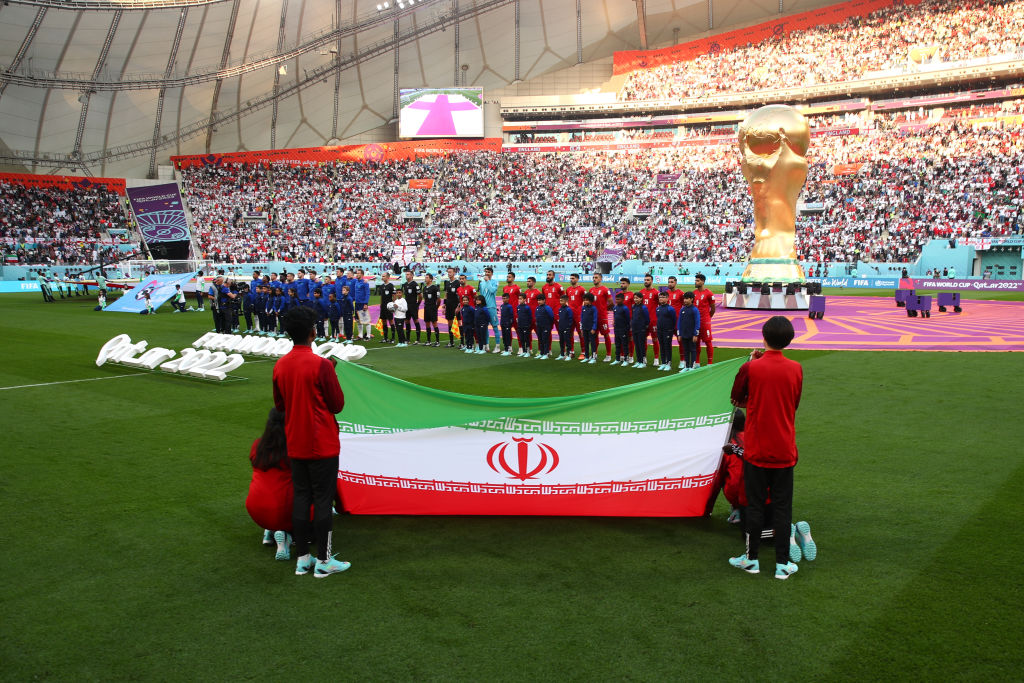Iranian unrest finds a voice at the World Cup
Posted By Amin Saikal on November 22, 2022 @ 14:30

The FIFA World Cup in Qatar has enabled the captain of the Iranian football team, Ehsan Hajsafi, to bemoan the unhappy situation in his home country. In a daring act, he and his team have expressed support for the protesters against Iran’s Islamic regime by refusing to sing the national anthem at the start of their match against England, with a claim to stand by the Iranian people.
In choosing the World Cup as the venue, the Iranian soccer team has sought to give an international voice to the ongoing protests, led by women, and override the Iranian government’s strict censorship at home. The team has essentially reflected the continuing defiance of their compatriots in sustaining the longest period of protests that the Islamic regime has faced during the 43 years of its existence.
In the past, the regime was able to put down any public challenges swiftly, as it did with the demonstrations over the disputed results of the 2009 presidential election and the 2019 protests over economic decline. But this time, its harsh crackdown hasn’t deterred the protesters from maintaining their rage for freedom from theocratic impositions, deteriorating economic and social conditions, poor governance and corruption.
According to human rights reports, some 400 protestors have been killed and many more injured since Mahsa Amini’s death in the custody of the morality police on 16 September. In addition, around 15,000 demonstrators have been detained, with some already tried in court and sentenced to death on charges of moharebeh (‘waging war against God’) or ifsad fil ardh (‘corruption on earth’), given the proclaimed Islamic nature of the Iranian regime. In the process, dozens of security personnel have also lost their lives.
The regime has dismissed the protests as ‘riots’ and accused Iran’s adversaries, the US and Israel in particular, of fuelling them. Washington’s vocal support of the protesters and its imposition of fresh sanctions against Iran have certainly enabled the regime to highlight what it calls evidence of foreign interference.
While shaken by the unrest and US and allied pressure, the regime has hit back with its usual defiance. It is internally accused of having done little to assuage public concerns about why Iran’s oil and gas riches have persistently remained captive to Washington’s severe sanctions. It is also chastised for largely failing to address citizens’ unhappiness about the mismanagement of the economy, administrative malpractice and waste.
However, in a close integration of its domestic and foreign policy behaviour, the regime has done whatever possible to ensure its security and by the same token that of Iran. It has drawn on such instruments of state power as the all-pervasive Islamic Revolutionary Guard Corps, the paramilitary Basij force and the network of mosques and reigning sociocultural institutions, whose survival is intertwined with the continuation of the Islamic system. Beyond this, the regime has fostered firm relations with several protégé subnational groups and the Syrian regime in the region, and close strategic partnerships with Russia and China.
Regarding Russia, it has sided with President Vladimir Putin’s aggression in Ukraine, providing Moscow with deadly drones and missiles to counter US-led assistance to Ukraine, and also to demonstrate Iran’s military capabilities against adversaries in the region and beyond. In doing so, the regime has left behind Iran’s historical distrust of Russia and departed from the dictum of Ayatollah Ruhollah Khomeini, the founder of the Islamic Republic, who had advocated that its foreign policy be ‘neither East, nor West’, but pro-Islamic.
All this means that the Islamic regime is well entrenched and possesses sufficient coercive means, along with Russo-Chinese backing, to maintain its uncompromising postures. The protesters may have the people’s power behind them, but they face an uphill battle to extract many concessions from the ruling clerics. They have unleashed a powerful movement in challenging the regime, but their lack of a unifying leader, platform and wider community support, including from the rule-enforcement apparatus, place them at a disadvantage.
Iran is now locked in a long-term state of protests, crackdowns and mourning. Every time the security forces kill a protester, in the Islamic tradition, the 40th day after his or her death provides an occasion for commemoration and protests followed by a state clampdown. The best option is for the ruling clerics to negotiate for meaningful structural reforms, but that may not come soon enough for the Iranian football team and public.
Article printed from The Strategist: https://www.aspistrategist.org.au
URL to article: https://www.aspistrategist.org.au/iranian-unrest-finds-a-voice-at-the-world-cup/
Click here to print.